Tropical Cyclone Seroja Tests Indonesia
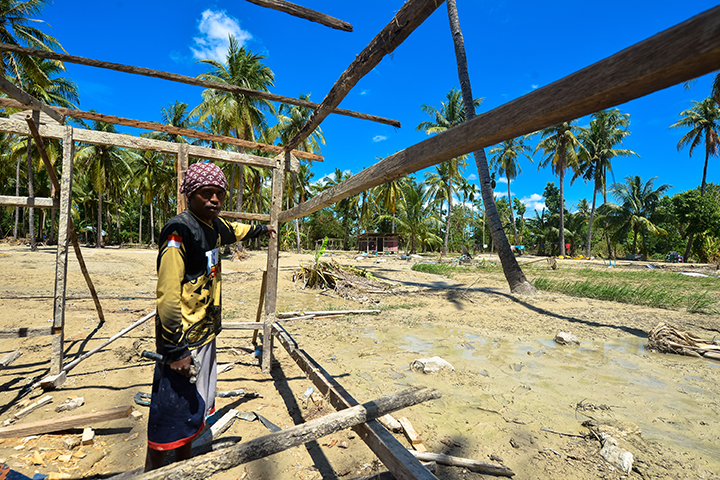
A series of disasters, ranging from flash floods, landslides, to tropical cyclone Seroja hit the province of East Nusa Tenggara. Residents affected by the disaster fled and were limping but they persisted in rebuilding their homes. In addition to providing assistance, Tzu Chi stepped in to give motivation in the midst of the difficult situation. No less, the children also got consolation to treat trauma.
*****
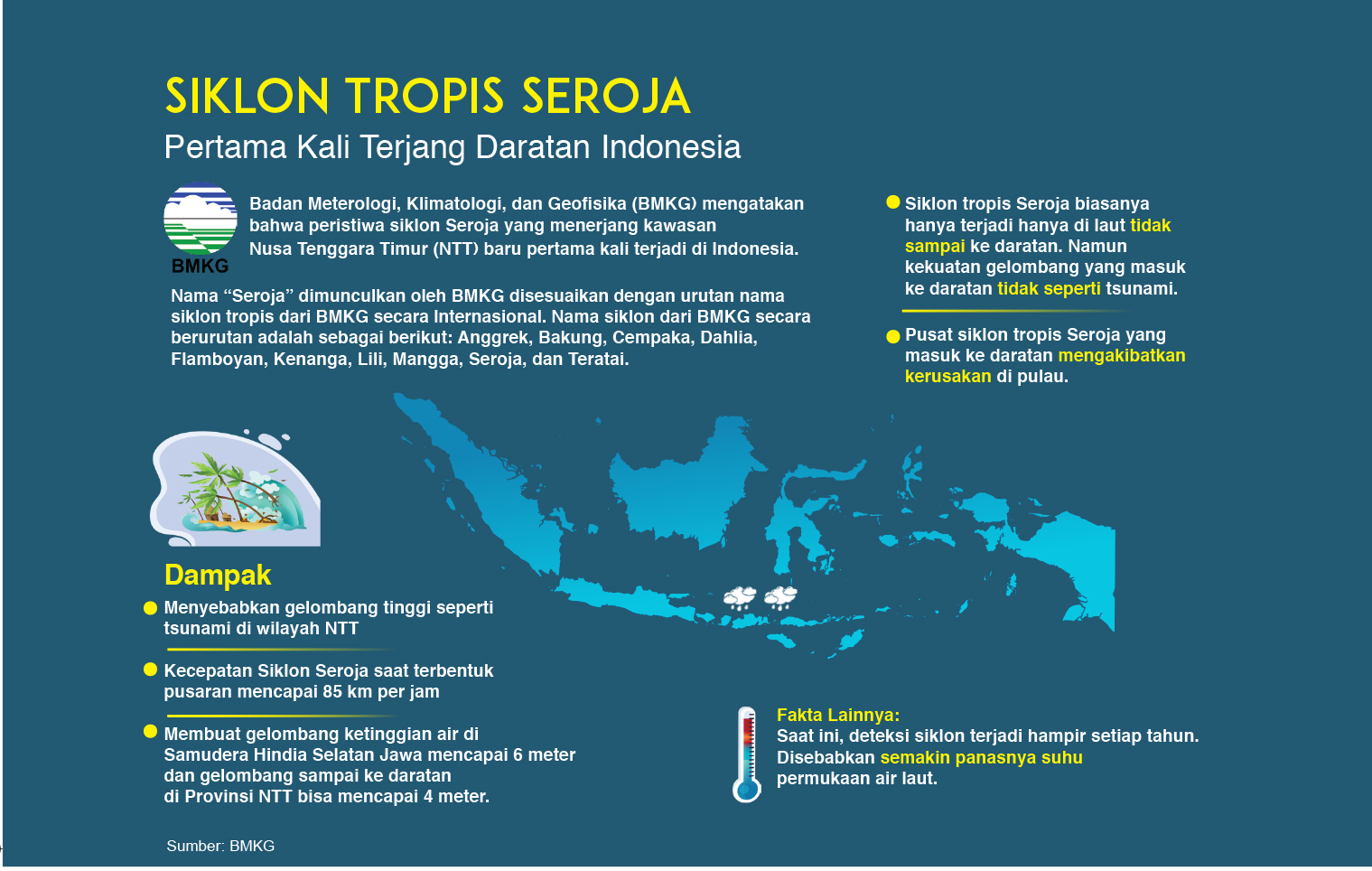
Yeson Humau (55) never thought that one day after Easter this year would end in disaster. Yeson's plan that day was simple enough: to finish working in the fields, then clean up to get ready for church.
The weather turned out to be unfriendly. Heavy rains flushed Naibonat and Kupang City, East Nusa Tenggara, in the afternoon. The rain was in fact the beginning of the raging cyclone Seroja. "Luckily I can be with my family at home," said Yeson.
Rain and wind swept hard. Phone signal was cut off. Kupang and other areas instantly turned dark and eerie.
Post-Disaster Survival
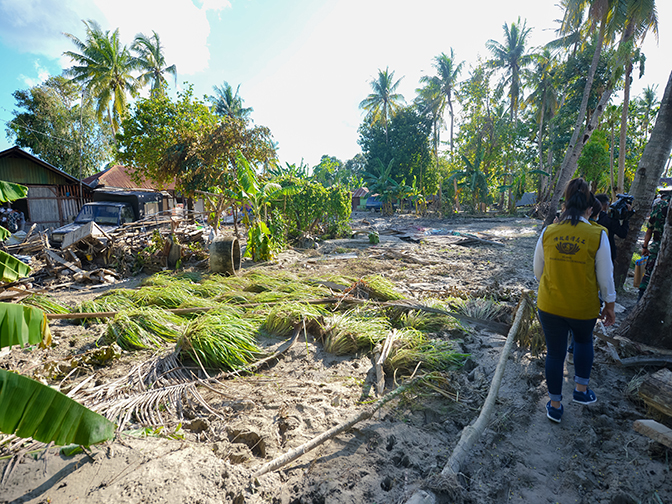
Volunteers from Tzu Chi Jakarta and Tzu Chi Sinarmas Kupang City immediately delivered assistance to the flood victims in Fatu Feto District, Kupang City and Kel. Naibonat, Kupang Regency. The flood was caused by the overflow of the Oesao River that crosses the Naibonat village.
Yeson said, the flash flood hit on Saturday night at around 23:00 WITA. The water from the Oesao River rose up in short amount of time that on Sunday at 16.00 WITA, the settlement of the residents of Naibonat was flooded as high as the chest of an adult.
In addition to high puddles, Yeson and his family were also faced with strong currents which caused difficulty to escape to safer land. The overflow of the Oesao River ran into plantations, rice fields, and overtook residential areas as well as Yeson's palawija plantations.
“My family and some residents were trapped at home. Some climbed up the trees while my family and I climbed onto the roof of the house to escape. If we hadn’t, we could have been dead as the water below was so massive and strong, "said Yeson.
Yeson's wife and children fled on the roof of his house and waited for help to arrive. Surrounded by the high flooding and strong currents, Yeson and his family could do nothing but stayed still, whispering prayers and hopes for safe evacuation.
“This flood was so heavy it reached your chest. I have a wife and four children and I pulled them up to roof. My wife cried in fear. We stayed there continued to pray for God's help. Praise God, in the next morning we were able to get out of the flood safely," he said.
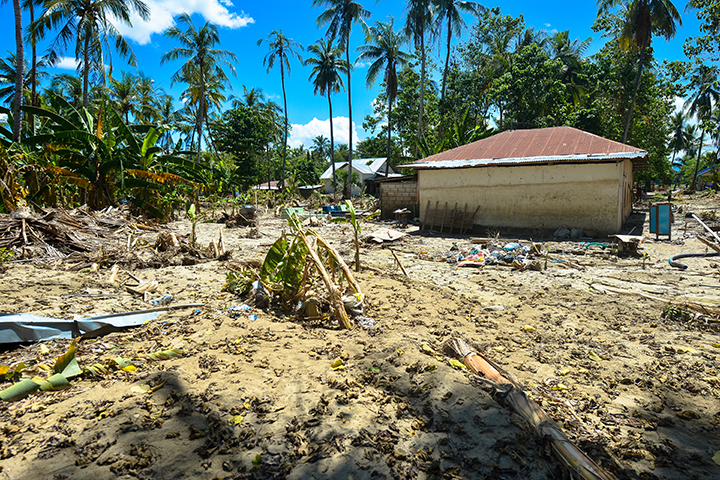

One of the houses in Naibonat Village affected by the disaster left a flood line on the walls marking almost 2 meters high.
Luckily, the help arrived just in time. Several TNI soldiers from Brigif 21/ Komodo and local residents came to evacuate Yeson's family to a safe location and eventually took refuge at the Elim Naibonat Congregational Church.
The disaster made Yeson always grateful to God because his entire family was safe even though the furniture and 10 of his pet cows were washed away by the flash flood.
"The only thing left was the clothes we were wearing. Everything else was washed away by the flood. We just thought to save ourselves first,” said Yeson. "I am very grateful, Praise God. You have saved us. Losing a family is harder than losing property. The latter can be started over from scratch," he continued.
After being hit by the flood, Yeson's house was still standing though the back and side walls of his house collapsed. The furniture was scattered around the house. A few days later, Yeson slowly began to ooze knee-deep mud from inside his house.
On that occasion, Yeson, who is a farmer and cattle rancher wished to raise cows again for he knew that when the children went to school and needed big school fees, he could sell the cows. "So, for future plans I wish to have more cows," said Yeson.
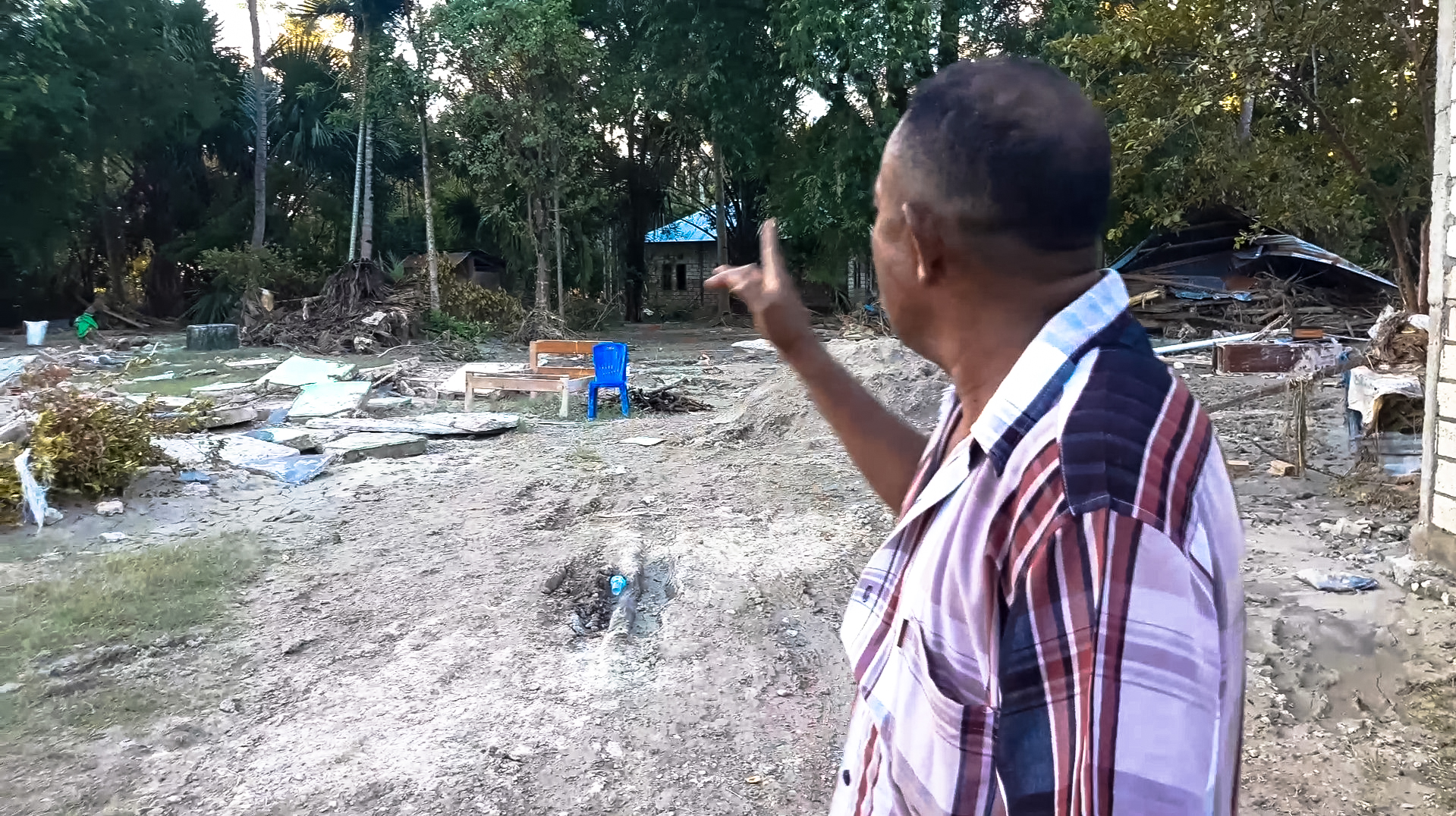
Yeson Humau pointed at the tamarind trees behind his house. Some people climbed them up during flash flood to save themselves.
Another story with Ismail Tabonat (56). He and his family managed to survive the flood with the help of a tamarind tree. When the water filled his house, he and his family held on to the tamarind tree so as not to be swept away by the flood while shouting for help. Not long after, residents came to help evacuate them from the flooded area.
“If there were no tamarind trees, people would have been carried away by the flood. Luckily, we held on to one of them,” said Ismail. He lost his 30 million cash from 3 year saving and 8 pet cows due to the flash flood.
Based on the data from Pastor Daud Tari, approximately 400 residents of Naibonat Village fled to church due to the flash flood that hit the Naibonat area. Dozens of houses were washed away and damaged due to the heavy flooding of the Oesao River.
“There are 400 people who took refuge at the church and currently there are 26 people who are still staying. Apart from parents, many children and toddlers are staying in this church because their houses were washed away and buried in mud from the flood,” said Reverend Daud Tari from the Elim Naibonat Congregational Church.
Citizen Independence
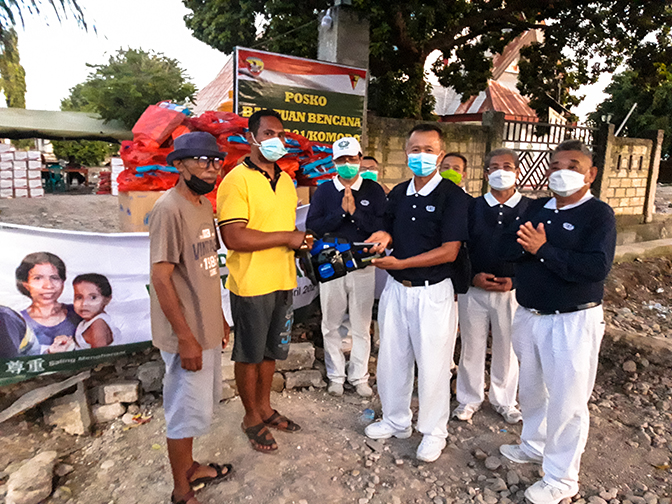
Tzu Chi volunteers delivered emergency packages in the courtyard of the Elim Naibonat Congregational Church. The aid was received directly by Pastor Daud Tari.
In mid-April 2021, Pukdale Village, Oesao District in East Kupang NTT, was so crowded. Not only were the families of flood victims gathered in one church, but also residents in Village 4 were seen nailing wooden blocks to make house poles and tin roofs from the remnants of the flood.
While still taking refuge in a church, Difat Nubatonis (30), a resident of Dusun 4 independently rebuilt his house with wooden beams and a makeshift tin roof. When he was found in his house, Difat was building the pillars he had collected from the flash flood location. Difat rebuilt his house using woods and tins from the remnants of the flashflood.
“Living under the tarpaulins or tents are quite hot and they won't last long. I have a small child and feel sorry for that. It takes money and time to rebuild our house, so I have used just the right materials for my family to get together,” said Difat.
Tzu Chi Indonesia Aid for Disaster Victims in NTT:
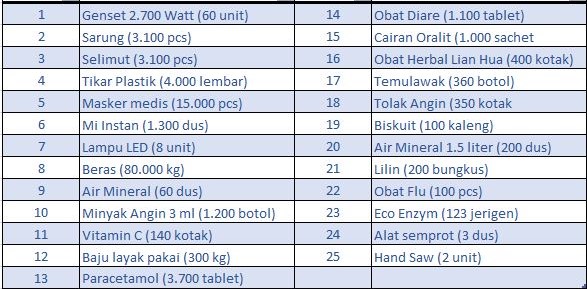
Source: Secretariat of Buddha Tzu Chi Foundation Indonesia
Difat's house was rebuilt on the same land beside his vegetable garden. Around his house, many crop such as tomatoes, chilies, and beans were damaged and washed away by the flood. The vegetable garden used to be the main source of income for the Difat family. Currently, only the wooden pegs and logs he had collected remain.
Difat decided to rebuild a house for his wife and son, Kensi Nubatonis (1 year 8 months). They had to do so because they felt bad to stay in the church too long.
“I realized that if I didn’t rebuild the house, I could stay there (church) for months. Maybe one month or even more because my house was all washed away,” said Difat.
Difat also didn’t not put too much hope in the government's helping hand. “I took the initiative to rebuild my own house to live in. We chose to come back and grow crops to sustain our living in case of rice shortage," said Difat with his Timorese accent.
Despite the good news that each family with heavily damaged house would soon receive 50-million-rupiah funds from the Central Government, Difat did not stand idly. He considered that not only one or two villages were affected by this disaster, but almost all areas in NTT Province were. He could not just sit and watch. "I have to start rebuilding my house to live in," he said.
Difat and other Pukdale Villagers had also long-term thinking. The public donations and government’s disaster relief program would end soon, and they had to take care of themselves. Therefore, they must live independently and properly by building their respective dwellings.
Regarding food, said Difat, they relied on local foods such as corn, cassava and rice. "Rice has become the main food but we also rely on corn and cassava for alternative," he said.
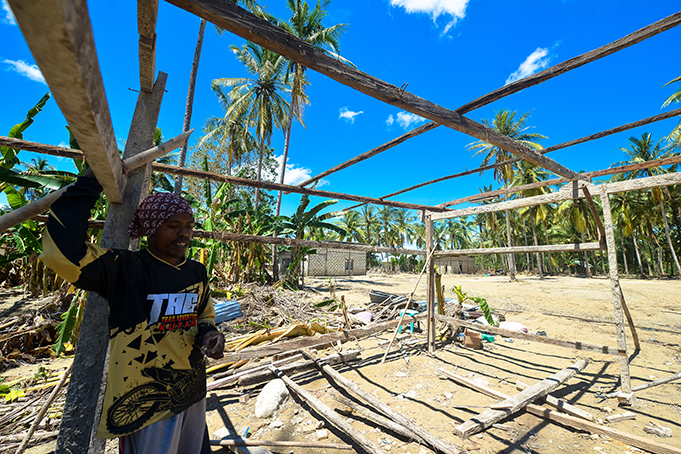

Difat Nubatonis, a resident of Dusun 4, Pukdale Village, independently rebuilt his house using tins and wood from the remnants. Around his house, the secondary crops were damaged and washed away by the flood.
Altrisna (29), Difat's wife, said they had received great help from church for food and shelter. The church can supply rice for the residents in the next few months. "On the first and second day of evacuation the church was there providing food for us," she said.
Pukdale residents were not bothered by food stock due to the sufficient supply, one of which was from the Buddha Tzu Chi Indonesia Foundation. Tzu Chi Foundation provided 2 thousand kg of rice, 45 boxes of instant noodles, 200 sarongs, and 200 blankets for the residents of Pukdale Village.
When Tzu Chi Indonesia volunteers delivered relief items to the Gmit Mizpa Church of Tetebudale, a refugee camp in Pukdale, I witnessed women cooking rice in three wood-fired stoves in three large cauldrons. In the church, groceries and several cartons of instant noodles could be seen in the corner of the room. Corn, papaya flowers, and spices were stored in the kitchen.
Stories about local food that really helped the victims of the natural disaster before the relief aid arrived, were experienced by the residents of Pukdale Village. In such difficult condition, local food from the unaffected gardens of the residents had become emergency food for the village. The NTT Provincial Government then began to distribute the incoming relief aid to their area along with the support from Tzu Chi Indonesia Foundation.
"For us here, before the relief aid arrived, the local food had been a tremendous help after the disaster. And it was provided by our church," said Altrisna.
Writer and Photographer: Anand Yahya
Translator: Vissia Budi Apriliana, Sweete (Tzu Chi School)








 Sitemap
Sitemap